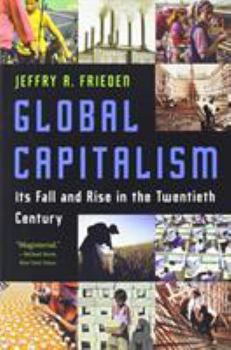Global Capitalism: Its Fall and Rise in the Twentieth Century
Select Format
Select Condition 
Book Overview
Globalization is a choice, not a fact. It is a result of policy decisions and the politics that shape them. Jeffry A. Frieden's insightful history explores the golden age of globalization during the early years of the century, its swift collapse in the crises of 1914-45, the divisions of the Cold War world, and the turn again toward global integration at the end of the century. His history is full of character and event, as entertaining as it...
Format:Paperback
Language:English
ISBN:039332981X
ISBN13:9780393329810
Release Date:April 2007
Publisher:W. W. Norton & Company
Length:556 Pages
Weight:1.06 lbs.
Dimensions:1.4" x 5.5" x 8.2"
Customer Reviews
5 ratings
Excellent and fascinating read
Published by Thriftbooks.com User , 13 years ago
An excellent and fascinating walk through the origins and evolution of capitalism and its profound effect on every aspect of human society.
fantastic book
Published by Thriftbooks.com User , 16 years ago
This was one of the best business books that I have ever read. It provides a thorough overview of the history of business globalization, yet it is not academic at all. Although it is long and has a few, short dry spots, it is an easy read that is engaging from beginning to end. The lessons from history are very applicable today. I highly recommend the book to anyone that works for a global company or wants to understand the forces of globalization and the impacts on our economy today.
Almost tempted to give it a miss
Published by Thriftbooks.com User , 17 years ago
I was almost tempted to give the book a miss after seeing the high ratings that were given by reviewers that seemed to be anti-globalizationists (what an awkward term!) However, I came across the book at my library and gave it a chance, and I was not disappointed. It is a book that does a creditable job of summing up the ups and downs of the world economy over the past hundred years and more. And it also does a fairly good job of raising some issues and problems with the world economic system, and how the system had evolved to meet those issues and problems. On the whole, I think it's a balanced book, pointing out the critical need for free and integrated markets to raising millions in the world out of poverty, as well as some of the problems facing them. The only reason why I gave the book a four rather than a five is that it is not an easy read, and it is best read with some thought and analysis on the reader's part. Not necessarily a bad thing, but not something for everyone. By the way, do ignore those reviews that pretend to tell you what the author was saying in his book. I'm not sure that he's actually saying what they say he is saying. Read the book for yourself. It's worth the time and effort.
Globalization 2.0
Published by Thriftbooks.com User , 17 years ago
Jeffrey Frieden, a Harvard professor specializing in international trade and finance, has written a masterly and comprehensive history of capitalism from 1870 to the present. His history of globalization reminds us that it is not a recent develpment and that its current success is not guaranteed. The first era of globalization (1870 to 1914) had many of the same characteristics as today's. There was an unprecedented cross-border movement of goods, capital, and labor. (Labor more so in the first era.) During these years huge amounts of capital moved overseas to America, Canada, and Argentina mainly due to the reduced costs of communication and transportation. The technologies driving this globalization were the telegraph and railroads. It was also facilitated by the fact that most currencies were convertible to gold. The investment in the Americas was also followed by a huge immigrant population. In these years, America, Canada, and Argentina had much larger immmigrant populations at the turn of the 20th century than today. The main thing that distinguishes the present globalization from the first is what happened in between. After the Great Depression and World War II remedies were put into place to mitigate the damaging effects of these economic and social catastrophes. Social benefits such as unions, minimum wage, healthcare and pensions were established as safety nets. In the era between the two globalizations when economies were mostly national the safety nets were part of the social contract between capital and labor. In 1980, when our current era of globalization begins, capital began to move overseas again in order to find countries with lower labor and social costs. This time, however, labor did not follow. The industrialized countries now have large middle classes with social benefits promised who are not certain about how they are going to be paid. This is causing many in the industrialized world to have second thoughts about our current phase of globalization. Frieden has a guarded optimism about global capitalism and thinks it is still the best system for distributing wealth. Yet, his last chapter "Global Capitalism Troubled" points to some more clouds on the horizon. There seems to be a growing gap between those who control capital and those who work for a living. People understand that globalization is inevitable but they want a new set of rules to address the growing inequalities. Frieden is a cheerleader for a more equitable capitalism that can deliver both social benefits and robust economic growth.
Very Pleasing to Read (Even for a Proletariat like Me)
Published by Thriftbooks.com User , 17 years ago
I read this book for a graduate-level economics course. It's not an "Econ for Dummys" book, but it really enightens the reader about the history of economics in the 20th Century. It's smart and straight-forward. The author does not interject his personal perspectives, which is nice. He just puts it out there. A definite must-read for those entering the field of economics/history.




